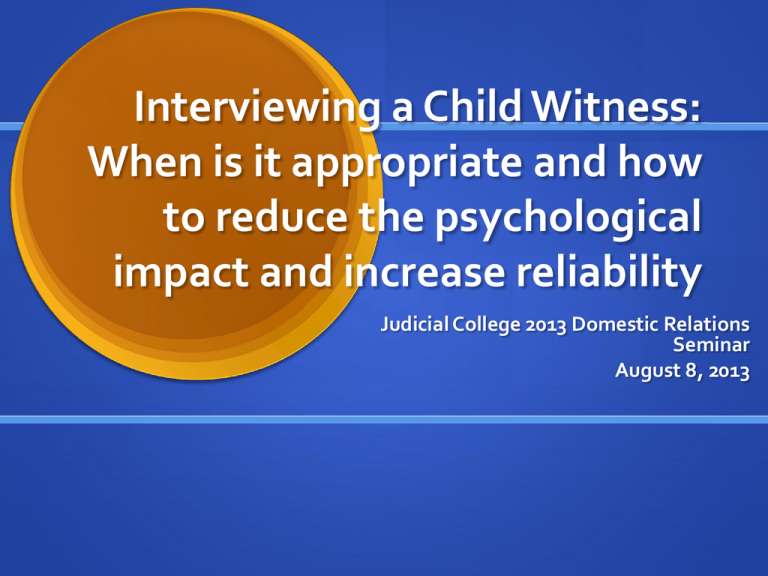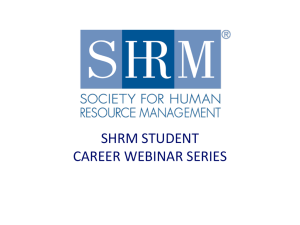Ruel1 Powerpoint - The Louisiana Judicial College
advertisement

Interviewing a Child Witness: When is it appropriate and how to reduce the psychological impact and increase reliability Judicial College 2013 Domestic Relations Seminar August 8, 2013 Presenter Julie Corona Ruel, M.Ed., LPC, NCC 2901 Ridgelake Drive Suite 206 Metairie, Louisiana 70002 504-339-3978 ruelcounseling@gmail.com What does it mean to have a ‘voice’? A voice is the sense of agency in all of us, that makes us confident that we will be heard, that we can impact our own environment. We should assume that a child’s voice, what a child has to say about their world, is just as important as what we have to say about it. Values of Judicial interview of the child Provides court with a first-hand understanding of the child’s experiences Provides a context within which to consider the information provided by parents and others regarding the child’s best interest Because the child’s future is profoundly impacted by a custody decision, the child should have a voice in the determination of a custody schedule Arguments against the Judicial interview of the child Child potentially further traumatized by his participation in parents’ conflict Child feels forced to ‘choose’ a parent, potentially further jeopardizing the future parent/child relationship Child is not competent or qualified to provide valid or reliable information Judicial interview of the childthoughts to consider what factors do judges consider when deciding whether to interview a child or not what concerns do judges have regarding interviewing children whether judicial interviews are helpful or not OPEN DISCUSSION What is the judge’s priority in the interview? Judicial survey of state court judges in Arizona found philosophically different viewpoints between judges • For some judges, the goal of procedural fairness to the litigants seemed to assume priority • For others the paramount goal was to facilitate the child’s meaningful and confidential participation in the litigation process Purposes for the child interview Fact finding vs. gathering information Allow the child to become part of the process Allow the child to meet the decision maker and understand the process What will they remember? People may not remember exactly what you did, or what you said, but they will always remember how you made them feel. - Maya Angelou Ages and Stages Profound differences in motivations and responsiveness to judicial interviews based on stage of development The age of the child effects both the type of questions that are appropriate as well as how the questions should be worded There are significant differences from age to age regarding the ability to comprehend concepts Differences are also found in the linguistic content and quality of answers provided Preschool and Early Childhood Use and interpret language literally Have difficulty collecting ideas into categories Use words for time, distance, size, etc. long before they understand the meaning May respond to questions even if they have no knowledge Believe in general that adults speak the truth, are sincere, and would not trick them Do not understand that they do not understand something Preschool and Early Childhood Black and white thinking Fantastic thinking Tend to want to care take of perceived victim Worry about personal survival (anxiety about food, shelter, safety) Prone to self blame and feelings of responsibility School Age (7-10) Still may believe all adults speak the truth Continued difficulty with abstract concepts (love, respect, affection) Unequipped to deal with insincerity (sarcasm, irony, etc)? Struggle with processing complex questions School age (7-10) Empathy is emerging Moral development – prone to intense condemnation Aware of own rejection and vulnerability Community relationships are becoming important- becomes a significant motivator Adolescents (ages 11-17) May or may not have developed adult narrative style Some difficulty with complex negation Confused by complex ambiguity- idioms, jokes, etc. Reluctant to ask for clarification or state that they don’t understand Adolescents (ages 11-17) It’s all about me!!!! Psychological emancipation – solidification of personal identity Possible de-idealization of one or both parents Child will place peer needs over family Listen for extremes Discussion How does the developmental stage of the child effect interview style and content? In what ways can developmental stages be taken into consideration when structuring an interview? How does the developmental stage of the child effect how interview responses should be considered? What are the differences between the motivations of early childhood, school age and adolescent children? OPEN DISCUSSION Interviewing Techniques Explain purpose of meeting Opportunity for child to ask questions Introductory background questions Keep questions open ended & vocabulary simple Avoid asking directly for preference, ask child to describe homes, relationships If child wants to state a preference, the child will do so in response to a very-opened question like: “Is there anything else you would like to tell me?” Opening the Interview Rapport development - Improves the child comfort in the setting - -Questions about family, friends, activities, etc. without an agenda- only to ease anxiety * Simple explanation of the purpose of the interview - i.e. “to hear what you have to say” - “to help me improve the situation for your family” • Encourage questions about the process and purpose of interview and the role of a judge Opening the interviewconsiderations Promote the child’s feeling of having a say so or a ‘voice’ in the matter Avoid the child feeling the pressure of ‘choosing’ between parents Avoid the child feeling omnipotent- as if his/her ideas will be the deciding factors in the matter Confidentiality Allow the child to know who will have access to information Complete disclosure leads to feelings of understanding and avoidance of undue anxiety Open Ended Questions Start with WHAT and WHEN Cannot be answered with one word Avoid WHY Formulation is harder than it sounds Develop a script Pre-formulation of questions based on age Questions Develop discrepancy Best – worst Like most- like least Measurement Scale of one to ten Miracle questions Three wishes If you woke up tomorrow and everything was ok….. Ascertaining facts Open ended questions Problem- children have trouble with free recall Children under 12 require cues to stimulate recall Specific questions Can be leading and influence future answers The younger the child- the greater the potential for leading effect In empirical studies, there is no significant difference in the suggestibility between adults and children OVER 10 with regard to leading questions Thoughts to consider Am I going too fast? Am I hearing this child? Am I sacrificing this child’s interests for some other objective (the rights of the litigants)? Is my attention on the child’s words, behaviors and emotions? Am I failing to reassure the child to remove blocks to communication? Assessing reliability Coaching Words ‘mirror’ words or phrases used by parent or other participating party Knowledge of the process not appropriate for age Combat effects of coaching through expansion Tell me more about that Ask expansion questions specific to topic Special Considerations Domestic Violence Physical child abuse Sexual abuse Extreme child alienation Interviewing children- pitfalls Asking manipulative questions Isn’t it true…? Didn’t you say…? Complex questions Abstract or low frequency words Two or more questions imbedded into one Legalese Interviewing children- pitfalls Asking complex, multipart questions Asking if the child understands you Asking how and why questions Asking truth/lie questions Asking about relative concepts: relationship, time, distance, kinship, etc. OPEN DISCUSSION What challenges have you encountered in interviewing children? Based on the material presented, what challenges do you foresee in interviewing children? Bibliography Cronch, Linda E., Viljoen, J., Hansen, D. (2006) Forensic interviewing in child sexual abuse cases: Current techniques and future directions. University of Nebraska, Faculty publications. Goldberg, Dan (2004) Judicial Interviews in Children: Time to pause and reflect. http://www.cclaabcc.ca/uploadedFiles/Practice_Portals/Family/Local_Practice_Informatio n/Judicial%20Interviews%20Article%20No%202.pdf Graffen-Walker, A (1999) Handbook on Questioning Children, a Linguistic Perspective .Washington, D.C. ABA Center on Children and the Law. Rogers, Lisa Carroll (1987) Child Custody: The judicial interview of the child. Louisiana Law Review, Developments in the Law 1985-1986. Volume 87, Part 3







